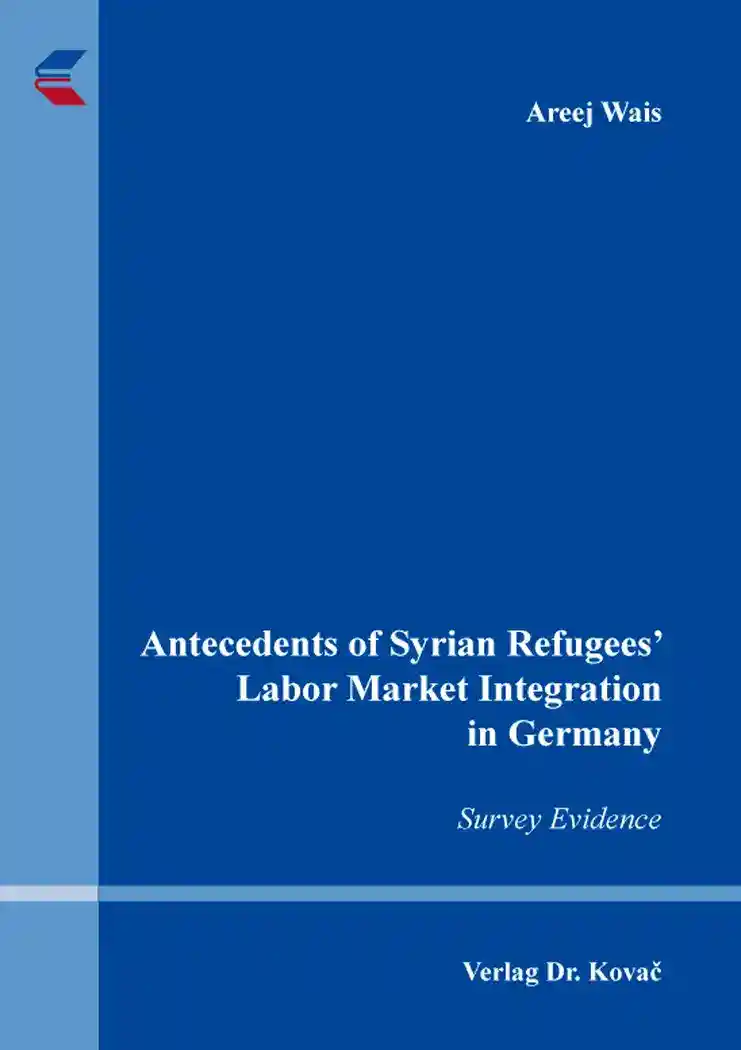Areej WaisAntecedents of Syrian Refugees’ Labor Market Integration in Germany
Survey Evidence
– in englischer Sprache –
Personalwirtschaft, Band 566
Hamburg 2023, 198 Seiten
ISBN 978-3-339-13422-6 (Print) |ISBN 978-3-339-13423-3 (eBook)
Zum Inhalt
After the last refugee influx to Europe, which coincided with the worsening of the so-called refugee crisis in 2014, the process of integrating refugees into host countries has been a major challenge for all European countries. Particularly in Germany, the topic most relevant to integration was related to successfully integrating refugees economically into the labor market.
Previous research at the international and the European-level show the disadvantages refugees face getting integrated socially and economically to host countries. The main focus of previous scholars has been on examining the factors that affect refugee’s successful performance in the labor market such as education level and their acknowledgment by the host country, personal characteristics, language skills, country of origin and length of asylum procedure. The ongoing research into refugees’ economic integration, though, has not yet sufficiently investigated other equally important factors such as refugees’ self-confidence, physical and mental health, work motivation, and work attitude and expectations, which can be expected to be important factors that can make it possible to understand refugees’ willingness to search for a job and integrate into the German society.
This study intends to narrow this gap in the literature. It applies a broader perspective in that it examines refugees’ work motivation and attitude to search for a job, which potentially constitute significant indicators for prospective labor market integration outcomes.
The study contributes to the research on the economic (especially labor market) integration of refugees in that it investigates crucial antecedents of refugees’ labor market integration: Refugees’ work motivation and attitude towards job search and unemployment. Understanding how such factors influence refugees’ behavior is potentially highly beneficial for helping host countries to successfully integrate refugees into their societies.
This study is guided by three research questions addressing Syrian refugees’ economic integration in Germany. The first research question highlights critical factors that facilitate Syrian refugees to gain employment or education in Germany. With respect to this question, this study complements prior research on the economic integration of refugees by investigating, for a large sample of Syrian refugees, how their demographic characteristics, their pre-migration experience and their post-migration experience in a short time window since arriving in Germany, are related to their job market integration.
The second research question investigates the determinants of job search behavior, with respect to this question, the study develops a job search model and investigates whether attitudes such as work value and motivation, perceived social pressure, and perceived behavioral control explain an unemployed Syrian refugee’s job search intensity. Such an investigation has not been, to the author’s best knowledge, done for refugee samples. The model provides an explanation for the antecedents of Syrian refugee’s job search behavior.
The study addresses a third question that investigates the work-related factors which lead to higher psychological distress. In other words, the study examines whether factors such as self-efficacy, work value, and negative experience of unemployment are also related to or could help predict psychological distress for refugees, who are willing to integrate
Answers to these research questions should contribute to a better understanding of refugees’ motivation to integrate into the German labor market. They further enrich the literature with a better analysis of how work values and psychological factors are related to the successful process of integration into the labor market. Examining the effect of refugees’ work attitudes and values on job search behavior provides insights for German authorities in avoiding long-term unemployment of asylum-seekers and refugees.
Schlagworte
ArbeitsmarktArbeitsmotivationBWLEconomicsIntegrationJob SearchJobsucheLabor Market IntegrationPsychological DistressPsychologische BelastungSelbstwirksamkeitserwartungSelf-EfficacyStructural equation modelingStrukturgleichungsmodellSurveySyrian RefugeesSyrische FlüchtlingeWirtschaftswissenschaftenWork MotivationWork ValueIhr Werk im Verlag Dr. Kovač

Möchten Sie Ihre wissenschaftliche Arbeit publizieren? Erfahren Sie mehr über unsere günstigen Konditionen und unseren Service für Autorinnen und Autoren.
